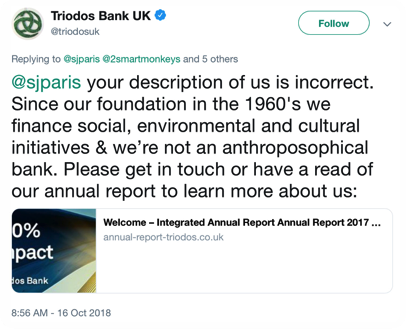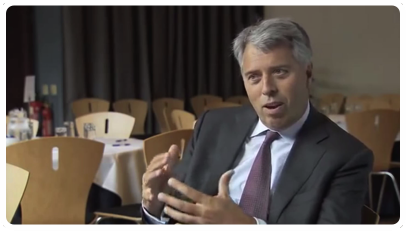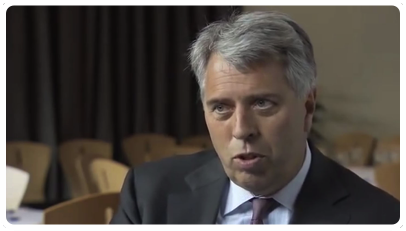Triodos - Welcome to Anthroposophical Banking

An Alternative Bank?
We’ve been aware of Triodos, and had heard of their links to Rudolf Steiner’s philosophy of Anthroposophy for some time, but our focus had always been on the educational aspect of this belief system.
Recently however, we’ve increasingly seen people happily recommending this bank as an ethical place to invest your money in. This made it clear to us that Triodos’ connection to Anthroposophy and the abuse surrounding this cult was very well concealed, so we thought it was worthy of further exploration.
As with all things related to Rudolf Steiner, it is never easy to get a straight answer.
Triodos’ own beautiful website only highlight the good that they do through their promotion of ethical initiatives, and praising their own transparency.
Threefold Origins - What’s in a Name
A book by Geoffrey Jones, “Profits and Sustainability: A History of Green Entrepreneurship”, makes the connection:
“The Triodos Bank, which grew to be Europe’s largest social bank, was formed in 1980 with $600,000 in share capital, and was part of a new wave of social banks in that decade.
“Its origins lay in a study group established in 1968 by four Dutch professionals for a heterogeneous set of people including anthroposophists, religious believers, and admirers of the small-is-beautiful concept of E. F. Schumacher. They discussed how money could be used more consciously and transparently. […] In 1980 they secured a full banking license and began operating as Triodos Bank.

“The name Triodos signified Steiner’s “threefold path.” Steiner’s “threefolding” concept divided society into economy, legal/political, and cultural components which needed to be treated holistically. The founders of Triodos saw its threefold task as supporting social, cultural and environmental goals and institutions. They aimed to promote development in these three areas at a reasonable profit. […]
“Before 1999, executive board members had to be “inspired” by Steiner’s anthroposophy, and they had to be approved by anthroposophical and Christian associations, but they did not formally need to belong to a Steiner organisation.”
Leaving Anthroposophy Behind
A 2004 Guardian article reported Triodos’ departure from Anthroposophy: “Triodos Bank's statutes committed it to anthroposophical principles until 1999, when this formal link was dropped, and in recent years the bank, under its current head Peter Blom, has embarked on a policy of reaching out beyond Steiner adherents and of broadening its appeal. Nevertheless, Triodos's origins are reflected in the fact that most of the Dutch directors come from within anthroposophy, and it is banker for many Steiner-inspired projects.”

More recently, we were told in October 2018 by a representative of Triodos, that they aren’t an anthroposophical bank.

This looks pretty clear cut, doesn’t it? Yes, Triodos may well have been founded on Anthroposophical beliefs, and despite the fact that they are still actively funding Anthroposophically-related projects such as Biodynamic farming, Steiner-Waldorf schools, and Camphill communities, those deeply rooted beliefs are now firmly in the company’s past.
It’s All in the Articles of Association
And yet… the most recent copy of their Articles of Association we could get our hands on still states that:
“The anthroposophical movement and the movement for religious renewal, the Foundation Christian Community, were the sources of inspiration for the people who established Triodos Bank.
Triodos Bank is – entirely freely – associated with the philosophy initiated by Rudolf Steiner, anthroposophy, which movement represents a key principle for the work of Triodos Bank.”
This document was published on the 8th of June 2015, sixteen years after Triodos had supposedly divorced itself from Anthroposophy.
You might argue that an Article of Association may be a static document that hasn’t been updated for decades and is therefore irrelevant - except that they do amend it from time to time.
Here’s an earlier version from 2012:
“The anthroposophic movement and the movement for religious renewal that is the Christian community were the sources of inspiration for the people who founded Triodos Bank.
Triodos Bank is – at its sole discretion – associated with anthroposophy, this being the humanities science initiated by Rudolf Steiner that accordingly forms an important basis for the work of Triodos Bank.”
Between 2012 and 2015 Triodos made their connection with Anthroposophy even clearer, going from considering Anthroposophy as “an important basis” to “a key principle” of Triodos’ work which Triodos associates with “entirely freely”. They are also still financing organisations who believe in the same.
Peter Blom Threefolding
Peter Blom has worked at Triodos since its inception in 1980, and has been its Chairman of the Executive Board since 1997. He was interviewed in June 2011 for a pro-Steiner documentary, and some of what he says shows how deeply ingrained Steiner’s philosophy is in him, and consequently in the bank.
Blom was a pupil at a Steiner School for seven years and its philosophy “influenced me a lot when I was quite young still, very interested in social questions.”
“Threefold social order was one of the most interesting ideas of Steiner,” he explains. “It’s human oriented, and I like that. The three spheres Steiner describes are the economics sphere, people have needs, other people have skills, and how do we bring those together.

“There is another sphere, the more spiritual, cultural sphere, where each person has a developmental challenge, and everybody should develop in their own way. Freedom is an important principle there, where in the economic sphere, the brotherhood, cooperation is the more important principle.
“Then of course we live together so there has to be a government there has to be a state who treats everybody on an equal base. So there, the principle of equality comes in.
“So the three principles of the french revolution, brotherhood, equality, freedom came back in a very organic way. and I was in love with the idea.”
Blom came across Triodos when he was at university. “It was still not a bank then, it was a foundation, and this foundation wanted to do something with money, how to deal more consciously with money. I was still studying economics, knowing about the threefold source of ideas, so I thought, ‘well let’s talk to them’.
“I started as a volunteer at Triodos, and started to be very interested in the whole question of money and impact on people, social life, and economic change, and I became the youngest coworker there, one of the first five.”
Blom’s view on profit sounds compassionately socialistic, and again,is linked to the founder of Anthroposophy: “I’m convinced that banks should look more at what is really needed in society and then make a feasible business. And you need some profit of course - you cannot do without profit - but you do not start with profit. Profit is the result.”
“I think that was something that relates strongly to what Steiner always said, profit is not something you aim for, profit is something that is a sign of a healthy operation. It’s emerging from healthy transaction and that is a much better way of looking at profit than putting it there as a goal, as an objective, and make everything work for that goal.”
As with Geoffrey Jones’ book, Blom doesn’t hide Triodos’ origins yet also claims Anthroposophy’s influence is limited: “What do we want to achieve with the bank? Going back to the roots means it has been created out of the Anthroposophical movement but it’s never been kept in the Anthroposophical movement. It has been a gift to the world, but a real gift not with strings attached.”

Our own research and this entire website shows that there are always strings where Anthroposophy is concerned, and it’s clear this belief system permeates everything Triodos does. Even the way it sees money comes from that belief system: “the whole terminology [Rudolf Steiner] introduced of ‘purchase money’, ‘loan money’, and ‘gift money’ is quite unique. It’s one of those things you will never read or hear in universities.”
The strap line their Netherland branch came up with, “follow your heart, use your head, Triodos bank”, also harks back to Steiner’s philosophy: “That’s for me a way of bringing anthroposophy,” Blom states, “because threefoldness is in that strap line, how you bring that into practice.”
Blom does admit that Anthroposophy has limits in today’s world, and that it must be sure to remember it doesn’t have all the answers: “that’s the fascinating thing about being an entrepreneur, being in business and having to communicate with the larger world . You cannot close yourself off and say, ‘well we know as Anthroposophists what we can talk about’… we can’t. We have to find the right sort of synthesis.”
Knowing how deceitful Anthroposophists can be when presenting information to the uninitiated - as shown by Grégroire Perra who blew the whistle on Anthroposophy in France - it is difficult to ascertain how sincere Blom actually is at that point.
Rudolf Steiner was clear from the beginning: any link with anthroposophy has to be concealed, and stated nearly a century ago, in 1924, “We are working toward threefolding, but we have to remember that an institution like the Independent Waldorf School with its objectively anthroposophical character, has goals that, of course, coincide with anthroposophical desires. At the moment, though, if that connection were made official, people could break the Waldorf School’s neck” [Faculty Meetings, Page 705].

What applies to one Anthroposophical institution, applies to them all.
We can however conclude from this interview that Triodos’ aim is to weave the concepts of Anthroposophy into our culture from an economic perspective: “I hear more and more people speaking about ‘this is purchase money’, ‘this is gift money’ and they don’t know where it is coming from, and I think it’s interesting what’s happening there, and that’s the way it would be.”
Covert Philosophy - The Long Game
When people from all walks of life start to endorse Triodos, we’d say the cult-ural economic weaving of Anthroposophy is going swimmingly.
Yet it’s clear that despite having publicly divorced itself from Anthroposophy, and claiming to be “banking that’s proud to be held to account”, Triodos Bank is still “controlled by foundations, with strong roots in anthroposophy”.
And although these ideas may sound intriguing on the surface, don’t forget that they originated from a cult whose philosophy asserts that angels from the seventh realm have a mission to save humanity through our children, that bullying is merely karma balancing itself out and shouldn’t be interfered with, that demons reside in anything electrical and can possess young children, hence their use is forbidden in primary schools, and that vaccines will hinder the quality of your next reincarnation.
Anthroposophy is the guiding principle behind Steiner-Waldorf schools, and reports of abuse of children in those institutions crop up regularly the world over; these schools vilify families who dare speak out against them; staff members aren’t immune to this treatment; and this “circling of the wagons” mentality extends to other Anthroposophical institutions as well, like Camphill communities.
If you still think that Triodos is not connected with the other branches of this organisation, bear in mind that it finances such schools and communities.
Do these pseudo-scientific beliefs sit well with your ethical aspirations?
It is fine not to want to be with a bank that invests in weapons of war, or profits from corrupt regimes, but where would you actually draw the line? Is being guided by a philosophy that ultimately abuses children, staff members, patients and entire families, a price truly worth
paying because your bank is threefolding its claims to be ethical?
In the end, the choice is yours. As Peter Blom said himself, “you have to take responsibility, and what your money is doing is something you should think about”.

